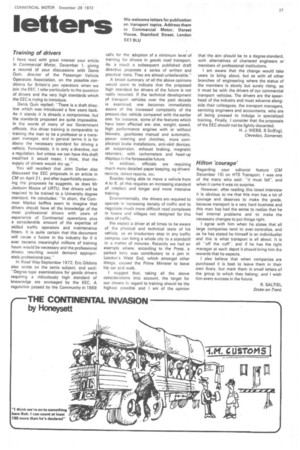letters
Page 29

If you've noticed an error in this article please click here to report it so we can fix it.
Training of drivers
I have read with great interest your article in Commercial Motor, December 1, giving a resume of your discussions with Denis Quin, director of the Passenger Vehicle Operators Association, on the possible conditions for Britain's psv operators when we join the EEC. I refer particularly to the question of drivers and the very high standards which the EEC is trying to introduce.
Denis Quin replied: "There is a draft directive which was introduced a few years back. As it stands it is already a compromise, but the standards proposed are quite impossible. In the words of many of our Government officials, this driver training is comparable to training the man to be a professor or a transport manager, and in general terms it is far above the necessary standard for driving a vehicle. Fortunately, it is only a directive, not a regulation, but unless we can have this draft modified it would mean, I think, that the supply of drivers would dry up."
You will recollect that John Darker also discussed the EEC proposals in an article in CM on April 21, and after superficially examining the proposals he suggests, as does Mr Jackson Moore of URTU, that drivers will be required to be trained to a University degree standard. He concludes: "In short, the Common Market boffins seem to imagine that drivers should have all the knowledge of the most professional drivers with years of experience of Continental operations plus a considerable amount of the expertise of skilled traffic operators and maintenance fitters. It is quite certain that this document will cause a furore in the industry for if it ever became meaningful millions of training hours would be necessary and the professional drivers resulting would demand appropriately professional pay."
In Road Way September 1972, Eric Gibbins also wrote on the same subject, and said: "Degree-type examinations for goods drivers requiring a ridiculously high standard of knowledge are envisaged by the EEC. A regulation passed by the Community in 1969 calls for the adoption of a minimum level of training for drivers in goods road transport. As a result a subsequent published draft directive proposes a series of written and practical tests. They are almost unbelievable."
A broad summary of all the above opinions would seem to indicate that the proposed high standard for drivers of the future is not really required. If the technical development of transport vehicles over the past decade is examined, one becomes immediately aware of the increased complexity of the present-day vehicle compared with the earlier one: for instance, some of the features which have been affected are: size, weight, speed, high performance engines with or without blowers. gearboxes manual and automatic, power steering and clutches, more complicated brake installations, anti-skid devices, air suspension, exhaust braking, magnetic retarders: with tachometers and head-up displays in the foreseeable future.
In addition, officials are requiring much more detailed paper keeping, eg drivers' records, detect reports, etc.
Besides being able to move a vehicle from A to B. all this requires an increasing standard of intellect and longer and more intensive training.
Environmentally, the drivers are required to operate in increasing density of traffic and to negotiate much more difficult road complexes in towns and villages not designed for this class of traffic.
We expect a driver at all times to be aware of the physical and technical state of his vehicle, as an involuntary stop in any traffic complex can bring a whole city to a standstill in a matter of minutes. Recently we had an example where, according to the Press, a parked lorry was contributory to a jam in London's West End, which amongst other things, caused the Prime Minister to leave his car and walk.
I suggest that, taking all the above considerations into account, the target for our drivers in regard to training should be the highest possible and I am of the opinion that the aim should be to a degree standard, with alternatives of chartered engineers or members of professional institutions.
I am aware that the change would take years to bring about, but as with all other branches of engineering where the status of the members is slowly but surely rising, so it must be with the drivers of our commercial transport vehicles. The drivers are the spearhead of the industry and must advance alongside their colleagues, the transport managers, servicing engineers and accountants, who are all being pressed to indulge in specialized training. Finally. I consider that the proposals of the EEC should not be lightly discarded. H. J. WEBB, B Sc(Eng), Clevedon, Somerset.
Hilton 'courage'
Regarding your editorial feature (CM December 15) on HIS Transport. I was one of the many who said: "it must fall", and when it came it was no surprise.
However, after reading this latest interview it is obvious to me that this man has a lot of courage and deserves to make the grade, because transport is a very hard business and this man has had the sense to realize that he had internal problems and to make the necessary changes to put things right.
I agree with him when he states that all large companies tend to over-centralize, and as he has stated he himself is an individualist and this is what transport is all about. It is all "off the cuff", and if he has the right manager at each depot it should bring him the rewards that he expects.
I also believe that when companies are purchased it is best to leave them in their own livery, but mark them in small letters of the group to which they belong; and I wish him every success in the future.
R. SALTIEL, Stoke-on-Trent.












































































